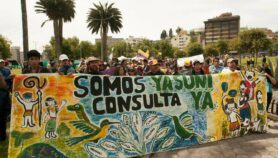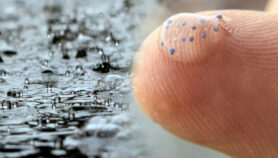Send to a friend
The details you provide on this page will not be used to send unsolicited email, and will not be sold to a 3rd party. See privacy policy.
Management of marine resources for sustainable development needs local capacity for science, particularly in the Pacific region.
Those who care about environmental damage and its effects on the health and welfare of communities tend to focus on land-based threats. That is where harm can be most easily observed, and where its causes — from agricultural pesticides to industrial air pollution — are most readily identified.
But this ignores the vast damage that human activity has also inflicted on the planet’s largest, and possibly most valuable, resource: its oceans.
Oceans cover nearly three quarters of the Earth’s surface, contain 80 per cent of its living organisms, and deliver 60 per cent of the dietary protein in tropical developing countries.
The services that oceans provide are now under threat from human activities ranging from severe over-fishing to mineral extraction, and from the impacts of acidification to global warming.
There is no simple response to these threats. But an essential component of any strategy to protect the oceans — and to ensure sustainable development of their resources — is effective, science-based management.
This, in turn, requires reliable data on which to base sound policy decisions (as well as an appropriate balance between science and traditional local knowledge).
So one of the biggest challenges facing communities that rely on healthy oceans for their survival — particularly the small island developing states (SIDS) in the Pacific and elsewhere — is building the capacity to both generate and interpret such data.
Oceans in the spotlight
This week, we present a number of articles highlighting the challenges faced in generating the robust scientific data that form the bedrock to effective management of marine resources, with a particular emphasis on the Pacific region.
Our Spotlight opens with an overview of the issues at stake. Sarah Grimes, the editorial consultant on this project, describes the main monitoring and data-gathering projects that currently operate in the Pacific, and how they help keep track of threats to sustainable development.
She outlines how ocean science developed from the early 1800s to the initiatives agreed twenty years ago at the first Earth Summit in Rio de Janeiro, and looks at the future challenges facing small island developing nations.
Grimes also warns that "Limited information can lead to poor decisions that limit countries’ capacity to develop without damaging the marine environment and the health of local populations, perpetuating the cycle of poverty".
In the first of three opinion articles, Ben Ponia describes how monitoring priorities have changed over the years in the Cook Islands, of which he is marine resources secretary. He highlights the importance of building local capacity to use scientific tools, and argues that Pacific islands need to take responsibility for monitoring into their own hands.
Fisheries scientist Johann Bell looks at how better monitoring data could improve fishing strategies. He argues that climate change, despite the dangers it presents, could actually benefit some Pacific countries through increasing catches of tuna. But success will require information from local communities, relevant training programmes, and long-term investment by countries themselves.
Ocean scientists Sidney Thurston and M. Ravichandran describe the growing risk of damage — whether through vandalism or negligence — to ocean buoys that gather crucial data for ocean and climate monitoring. They warn that without action to prevent such damage, the global community will suffer not only the financial loses, but also vital data, and even lives.
Finally, in a feature on the growth of locally managed marine areas (LMMAs) in the Pacific region — one of the success stories of sustainable ocean resource development — assistant news editor Naomi Antony describes the challenges in balancing the contribution of modern science with that of the traditional knowledge embedded in local cultures, and the practical demands of locally managed resource conservation strategies.
Signs of progress
Of course, good scientific data, and even well-designed conservation strategies, are not sufficient to ensure sustainable development. Equally necessary is a political framework to ensure that both are put into effective use.
So there are high hopes that one of the more substantial conclusions to emerge from the Rio+20 UN Conference on Sustainable Development, which takes place in June (20 years after the first Earth Summit), will be political agreement on the need for a number of steps to protect the world’s marine resources.
So far the signs are promising. The ‘zero draft’ of the final report for the conference, published last month, includes a commitment to a new treaty to protect the two-thirds of the world’s oceans that lie outside national jurisdictions. It also promises to address issues such as marine debris and ocean acidification.
There are therefore reasons to be optimistic that the Rio+20 conference will be a milestone in efforts to protect the oceans for future generations. But political agreement will be meaningless unless it can be translated into concrete steps. As Grimes points out, previous commitments have been slow to progress, partly because political priorities often work against the direction of good environmental management.
Future progress will rely on science playing a major role through spotting and analysing problems, identifying potential solutions, and monitoring how effective they have been. Much of this requires coordinated action at the international level.
But ultimately, true progress must be local. Those island states on the front line of problems created by poor ocean management need support and resources to develop their capacity to generate and use scientific data. Only then can they play a full role in establishing a more effective, and sustainable, approach.
David Dickson,
Editor, SciDev.Net
Anita Makri,
Commissioning editor, SciDev.Net
This article is part of a Spotlight on Ocean science for sustainable development.













